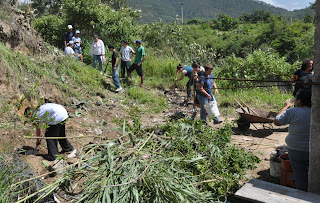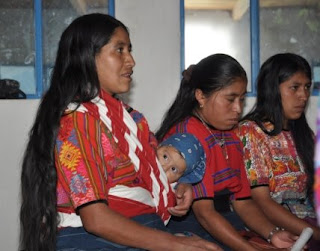I got to spend a week training inside the PNC academy. My part of the training was one full day, and there were three days of training run by the Naval Criminal Investigation Service (NCIS). What an experience!
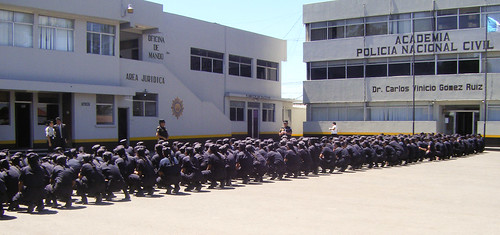
Outside the Police Academy buildings
Last November, we asked our U.S. Ambassador to Guatemala, Steven McFarland, to help us get in the door to help train the National Police (PNC). As a result, MIA was invited to tag along with NCIS during already-planned training to deliver our program "Hombres contra Feminicidio" aka White Ribbon Campaign. We want to thank the ambassador for the opportunity to speak to a classroom full of 60 trainers, and we're very proud of how the training went.
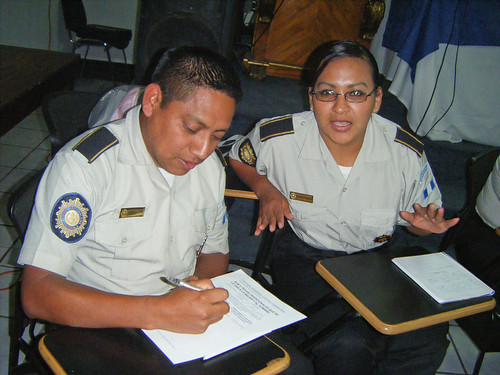
Students working together on a workshop assignment
While MIA was in action, the director of police academy joined us in the middle of an activity and without knowing who she was, I used her for an example and she volunteered without introducing herself. She was a good sport and played the role I asked her to, and after the activity was complete, one of the trainers came to me to ask me if I knew who she was. I did not know and she explained that she was the director. I immediately acknowledged her and asked her to join me in the middle of our circle and asked her if she could stay longer to hear the trainers request, complaints and wishes. I was assertive with her, just like back in my Girls, Inc. days when I had to be assertive with the high school administrators during our training with their students.
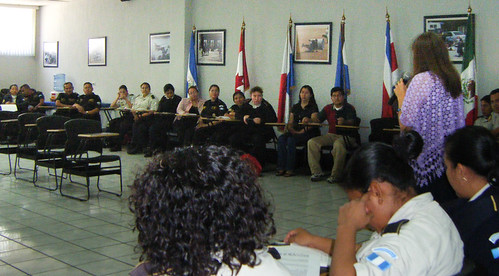
Lucia leading the workshop
She was very open and thanks to our moves, she liked our work and invited me to give an inspirational talk on Women's International Day to 460 new policewomen who are about to graduate.
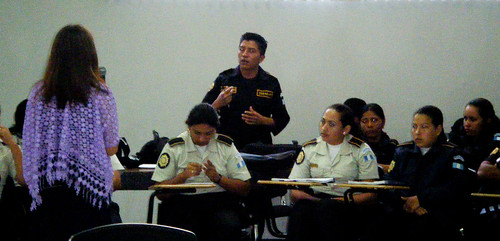
Students engaging in the workshop
I really wanted to have a male join me for the training, and luckily Carlos Ibanez, who has spoken to our delegations about human trafficing, recomended his buddy Eric who is a long time trainer for teenagers and Eric jumped on the opportunity. He is "between jobs" and our small honorarium meant a lot to him. I am hoping we can afford to have him do more training with us in the future.
I want to tell you more about the training.
My fellow trainers from NCIS came with a 3 day training of a translated domestic violence manual and walked the PNC through page by page for three days. The material seemed pretty basic. But while I was observing the first day, I figured out that NCIS had done their homework; they knew that we need to get our police men to understand their own biases on how to respond to a call for help. The first day was spent tapping into their biases and help the police women to be respected. What the NCIS trainers did not realize in advance is just how bad it is for the police women in Guatemala.
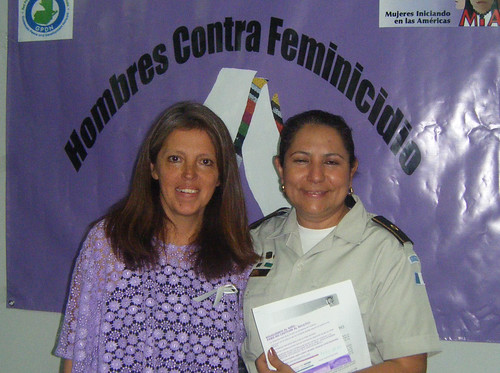
Lucia (left) and the Director of the Police Academy
One brave companera stood up and gave her own testimony on how hard it is to be a police woman. She and her coworker were sent to respond to a call and found a body hanging, she spotted from a distance and ran to the body, prompted her coworker and he responded to her; "you found him, you get him down." She had to pick up the body from hanging untie him and them put him down without dropping him and hurting him more. My fellow NCIS trainer's question was, "did you go to your supervisor?", a very common question we here in the U.S. would expect to do. The policewoman responded very assertively, "No". The trainer asked why, and the policewoman explained to her, that reporting a thing like that can only get her in trouble. The policewoman explained how hard they have to work to prove themselves all the time, and how it affects the concentration during their duty. Not only do they have to watch their back against the suspects when responding to calls, but also with their male coworkers.
They reported that they are not allowed to drive during a call. We women are seen as bad drivers and not aggressive enough to zig zag thru Guatemala's crowded streets. In one of our conversations during breaks, the NCIS women talked about our policewomen sisters in the U.S. going through the same kinds of things in the 1960s and 1970s. Probably, this is still happening still here at home but less visibly than in the early days, and much less visibly than in Guatemala.
Over and over, our NCIS trainer ended up giving the same lesson, if you reach a roadblock, you find a way to go over it, around it, or under it, but reach your goal. Guatemala women and men don't have the equipment to go around it, under it, or over it. Many times I felt the training was a teaser because they were given a training, but no assurance of a follow up to support the advice they were given.
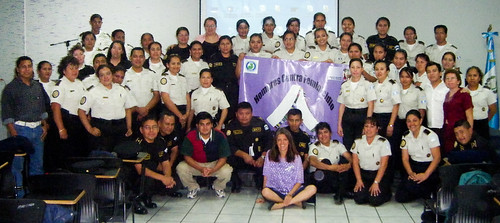
On Friday, after four days of training, the students got our certificates, and we got a certificate of appreciation plus PNC souveniers.
By popular demand, we were asked to go back in the summer. We don't have exact dates, but thanks to all of you who donated to MIA for this trip, we definitely have a foot in the door with the PNC. For the next training, I did assertively ask Uncle Sam to please write me in the budget. I reminded them we are a small nonprofit and how hard it was to find funds for this past trip. Our contact person at the embassy seemed to have some ideas on how to get us funding help for the next trip, but that's not for sure. We'll have to see when the time comes whether Uncle Sam can fund our trip expenses, or if we will have to ask you all again for donations to help with trip costs.
I will be making a family visit to Guate soon for my favorite nephew's wedding and will stay a few days extra to help a trainer in the city with her training skills. Many of the trainers asked me if I was going back soon, offered to help a group of eager to learn more women and one man, who impressed me, asked his boss to allow him to attend this week long training during his vacation time. His boss asked him, why would you want to give up your vacation time for a week long training and he answered him, just because. He shared with me, he did not want to explain himself, because he knew machismo is so ingrained, it was no use to try to explain the importance of this training.
It is for people like the women and this man who came to me for more information, that I knew it was necessary for us to be part of this training last month. I am planning to deliver three full days of our Hombres Contra Feminicidio training to a small group in a PNC station in Zona 1.
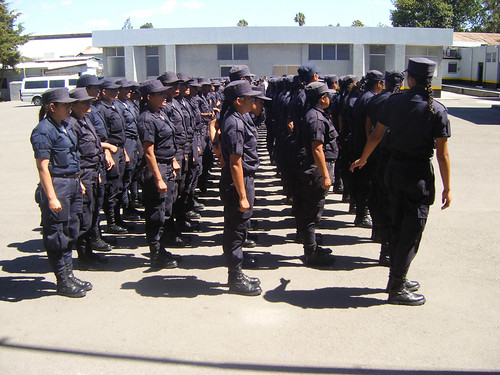
Policewomen at attention
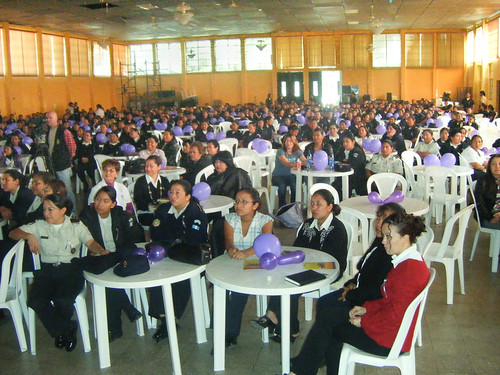
Addressing policewomen in training on International Women's Day
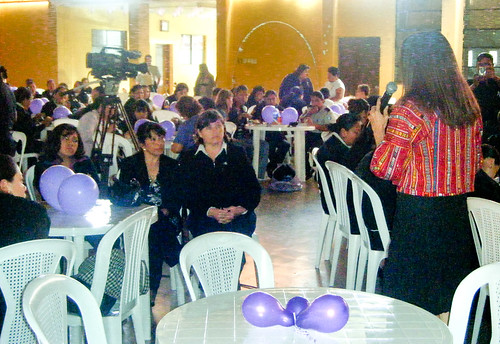
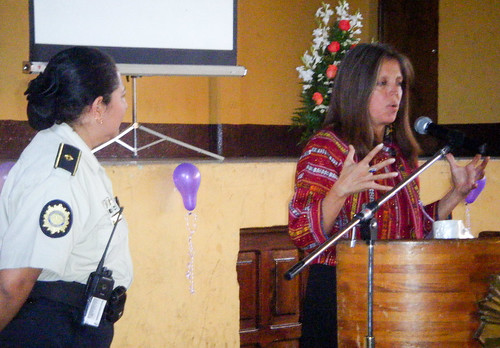
Lucia at the lecturn, with the Director of the Academy
I have a feeling we will be contacted to visit other stations and will have a chance to do more thorough work. What they want is more one to one attention, and this will help MIA understand better the ins and outs of the PNC. My hope is that we can find a grant for this leg work. I don't want to take money from our small pot for the three schools where we are delivering programs. Also, we need to find money to translate our manuals. The little we did translate was pure volunteer work from our star Daniel from our sister organization GPDN.
I am happy to communicate that MIA was part of the end-of-week debriefing and follow up with the trainers suggestions to the Director of Police with NCIS. During the debriefing I made the case that if we want to find out if what we did this week worked, we must follow up with the same group and hear them report to us in a couple of months. During this debriefing there were many talks of coming back, but I felt that we need to follow up or else we would only be putting one fire off and running to another and another. NCIS was very humbled by the 60 trainers and we could see their trainers got emotionally involved, and also suggested they want to go back to Guate. I reminded them of all our conversations with the trainer before and after training hours and how important it is to follow up with this group.
I am calling this our pilot program. I don't doubt we helped them, but really, we just scratched the surface. There is a much much more work to be done. I tried very hard to be assertive and talk about the impunity in my country with NCIS, but was told that that is not something they can help with.
Our goal is to continue going to the Police Academy and promoting the gender equality education until the Academy adopts gender equality education as part of its curriculum.
